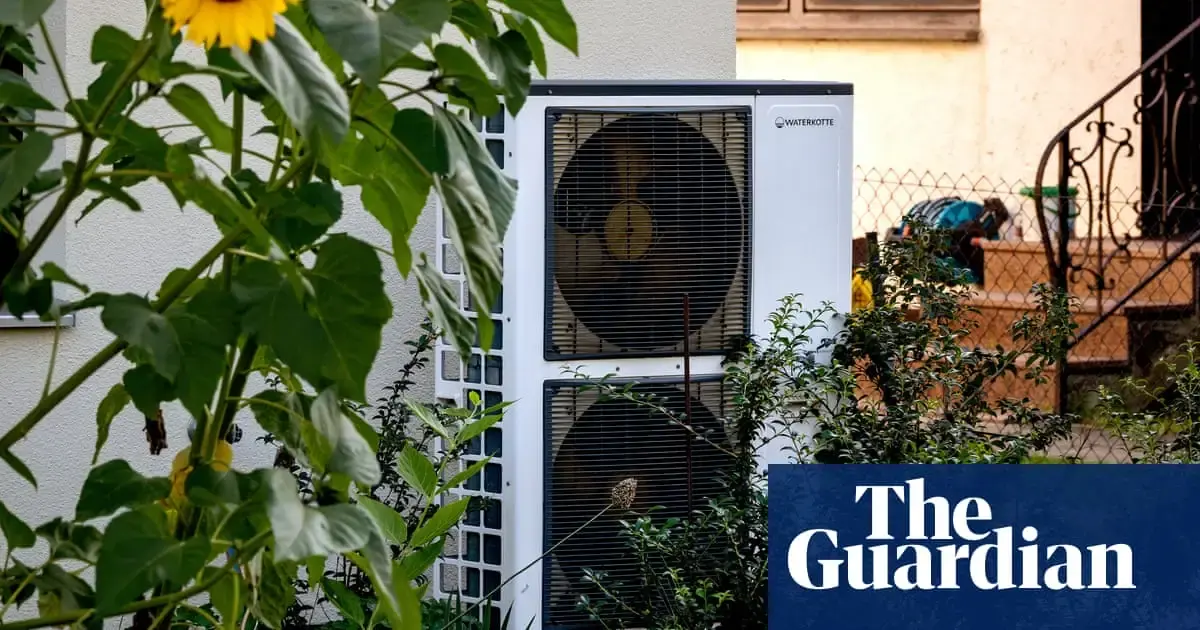But does it more effectively keep houses warm in cold weather, and cool in hot?
Heat pumps are most effective in moving heat from where it is abundant to where it isnt. This means they’re best at keeping your house warm in warm weather, and keeping it cool in cool weather.
Then a heat pump won’t do any good. Achieving the right temperature is far more important.
no he said “best”. they still work, just not as efficiently.
Has not been updated for a while, but relevant link…
https://www.energy.gov/eere/buildings/residential-cold-climate-heat-pump-challenge
The only downside (in comparison to fuel burners) is complexity. Heat pump systems are extremely complex with a lot of parts that could get fucked up over time.
A gas furnace is as simple as it gets with almost no moving parts. Coal/wood furnaces are a bit more complicated if you don’t want to blow 100% of the emissions into the air… you need good well maintained filter systems. But it’s still far less complex than a heat pump.
So I understand the appeal of furnaces. Simpler systems are easier to understand, are harder to break and easier to repair/maintain.
I think that problem is tackled too rarely in these articles. If you can’t take away the fear that people will have a higher upfront invest and higher maintenance costs and higher failure risk, that makes it too convenient to cling to what they know and understand.
Edit: oven --> furnace
Eh, I think you might think heat pumps are more complicated than they are. I think they’re about as complicated as a furnace. At the end of the day, in both your just pumping a gas from one place to another, changing the state of the gas, and then running that past air to heat or cool it.
It depends. The most basic implementation of a heat pump is basically an AC system with a reversal valve.
To be fair to the previous commenter, the air conditioning system of an air handler (aka furnace), is usually one of the more complicated parts of the system.
The issue is that even air conditioning systems are getting rather complex, with multi-speed or continuously variable speed systems… which add significant complexity… meanwhile adding a reversal valve to a continuously variable system easily makes it far more complex than any other system that’s integrated into the air handler.
I’ll also note that heat pumps come in many different shapes and sizes, some are mini split systems, others are geothermal bohemouths, and some are air-exchange systems to be integrated into an air handler (aka furnace). The most efficient heat pumps are usually the geothermal kind, which are pretty easily the most complex; air exchange heat pumps are basically just AC systems with a reversal valve… they all have their challenges though…
It’s just, a much deeper topic than saying that it’s strictly more, less, or the same level of complexity as something else, since from the start, the term “heat pump” represents an entire class of diverse devices… the same can be said about a furnace or just about any heating system… some are extremely simple while others make my HVAC guy cry out for someone to make it make sense. YMMV.
Heat pumps dont replace gas ovens. They replace central heating systems. They are not that much more complex then a central heating system and come with a lot fewer safety concerns. And heat pumps are not new technology - they are just AC units that can run in reverse to heat instead of cool. We already know how well they work and how often they fail and a lot of the world is already reliant on them just as much as others are reliant on gas central heating.
Non-native speaker; sorry. I meant furnace, not oven.
To be fair, they kinda do similar things. One heats up a tiny room, the other heats up the whole house… it’s sort of the same idea in concept.
No shit
A sticking point I encountered - the drop in efficiency as the weather gets colder means you need a unit sized to heat your home on the coldest days you expect to encounter. So you need to buy a heat pump that’s larger than you need for 98% of the year just so you don’t freeze that other 2%. In addition to higher cost an oversized unit is less efficient because it’s cycling more.
So this is where “heating strips” or “backup heating” come in, and then I get we’ve come full-circle.
You’d usually run two or more units in a cascade/multiplex when requiring large amounts of power rather than having one giant unit. Means you can turn off one or more units entirely for low heating demand.
Also choosing a unit (or units) that use a speed controlled compressor will limit cycling as they can ramp for the actual load.
Those “heating strips” are only used a few weeks every year in my case.
I don’t see how this is “full circle”. In places where it does get that cold, most homes already have a form of heating for the house. Adding on a heat pump or, at least in my case in the Midwest, replacing the central AC unit with a heat pump just means that you’re only kicking that original heating system on a few days out of the year. That’s a massive reduction in use compared to being the only source of heat for half the year.
It’s a problem that new construction homes would need to fix if they don’t want an NG connection at all, but it’s not unsolvable.
I think modern inverter units are not less efficient when oversized. They are able to run at varying levels rather than cycling.
Apparently it doesn’t work in Germany. Physics work differently here. At least that’s what our corrupt politicians want us to think
Germany has corrupt politicians? Say it ain’t so!
/s (all politicians are corrupt)
Actually, there is a noticeable difference between right leaning and left leaning parties, with the former being a lot more corrupt than the latter.
A lot more corrupt, sure, maybe. Not going to get into it too much… but that shouldn’t imply the other parties are not corrupt… just less corrupt. The diet version of corrupt… so to speak.
I hear that too. Not just politicians, there’s loads of experts lecturing on heating technologies. It’s just too cold in Germany for heat pumps. Doesn’t stop Scandinavia from getting them, granted, but in Germany it’s just too cold. No point. Sorry.
I can’t get an electrician and contractor to come install one (as an AC mainly) inside of 6 months, and I’ve been trying to find one for 6 months.
The heat is actually killing me I can’t sleep and have other health problems. I brought a dual hose unit from the US with me I’m running on a voltage converter and it’s the only thing keeping my apartment livable.
Too cold, too cold…
Follow the Money for who funds these studies
they do https://www.raponline.org/# feel free to investigate on them.
Makes sense. Heat pumps are one of the few heating systems that can achieve greater than 100% efficiency. (energy in vs total heat output)
As long as you can keep the evaporator above the evaporation temperature of your compressed refrigerant, you’re golden. Burried lines are excellent for that in colder climates, but the space for it isn’t always easy to find.
As long as you can keep the evaporator above the evaporation temperature of your compressed refrigerant, you’re golden.
Also keeping the evaporator from getting covered in ice where it doesn’t work. Yeah you can defrost but in certain weather it’s just going to ice up immediately.
It’s literally pulling heat out of thin air (or ground).
deleted by creator
Most modern heat pump systems account for that and have electric heating/defrosting built-in for those few cold days a year.
Also it’s not like you have to remove your old heating system*; you can just plumb in the heat pump into your central heating and have cut off valves for the original system, so you can still use it as a backup.
*) unless your government is retarded and in order to get subsidies they require you to uninstall it
The coldest temperature ever recorded in the UK is -27. That’s right around the inflection point for where heat pumps become less efficient than electric heaters. Until the gulf stream fails, the UK is pretty safe to use heat pumps everywhere.
deleted by creator
So yeah, going 100% air-source heat pump if you’re area regularly spends time around -30°C (-22F) might not be the best idea. Though even the last report you cited said it might be 1.5-2x as efficient as resistive heating. And that Site 1 with bad COPs was because they manually lowered the fan speed…
deleted by creator
Get a heat pump with resistive (electric) defrosting, not one that defrosts by running like an AC.
deleted by creator
The Guardian is a UK publication.
deleted by creator
Generally, cold climate heat pumps are an efficient source of heat down to -15 degrees Fahrenheit
“Generally” is the wrong way to approach this. What you should be looking at is the specific capabilities of the actual system that you are considering installing. Some of them can go much colder.
If the Mitsubishi FE18 isn’t efficient in your climate… then don’t buy that unit. Simple.
If it’s really cold where you are… then you could consider a ground source heat pump instead one that uses air as a heat source. The ground doesn’t get anywhere near cold to have efficiency issues no matter where you are in the world and ground source heat pumps don’t cost all that much… though they do require a bit of digging.
Also, if your heat pump is inefficient for a couple really cold weeks a year… oh well. You’re still coming out ahead because it’s very efficient the other 50 weeks a year. It’s not like they stop working at extremely cold temperatures, they just produce a bit less heat than you might like for the amount of power consumed. Maybe they’re “only” 80% efficient instead of 600% efficient… you know what else is 80% efficient? Heating with gas.
I’ll chime in here since I own 2 heat pumps and live in a cold climate (often below 20C). Our house is heated with 100% electricity and after installing heat pumps our power bill dropped by about 18%. That includes all electricity, not just heating, so the gain in heating efficiency was very considerable.
deleted by creator
it cannot be the only source of heat in a lot of cold climates.
I live in Finland. Heat pump is the only source of heat in my house.
deleted by creator
Some of the stations in Antarctica use heat pumps. They have been proven to work effectively at -53°C (-64°F) and do so reliably.
Are they more efficient at more reasonable temperatures? Yes. But they still work even when it’s very cold outside.
How well a heat pump works in cold temperatures obviously depends what temperatures it was designed to operate at. Don’t waste your money on a model that is designed to operate in a different climate. In fact a lot of heat pumps aren’t even capable of heating at all - they can only output cold air (which they can do even if it’s stinking hot outside by the way).
It can go down to -30C (-22f) sometimes or even below that
deleted by creator
Yeah averages are way higher than that. My point just was that saying they don’t work in cold climates isn’t quite true. Yes, there are locations with way colder climates than this but if Finland isn’t considered a “cold climate” then I don’t know what is.
Heat pumps are super common here. Many houses just have a electric resistance heating so people switch to heat pumps to save on electricity.
deleted by creator
Are you intimately familiar with the inner workings of your heatpump? Nearly all heatpumps in a cold climate have backup heat built in and it would automatically switch to backup when it gets too cold outside. -30C is well into the too cold category for it to function as a heatpump alone
Yeah I have no idea. The alternative would be electric radiators anyways so in most cases that wouldn’t make a difference anyways. Temperatures that low are quite rare - maybe just a handful of nights a year. Generally it stays around -10C
Which makes the argument that heat pumps don’t work in the cold completely wrong from a user perspective.
What happens when the power goes out
Well it obviously stops working and unless you have some other means of heating your house you’re kinda fucked and can only hope it comes back on soon as it generally does.
how often do you think the power goes out in finland
How often does it got out in Germany At least Finland built a Nuclear reactor to power most of the country unlike Germany which shut all their’s down
afaik power never really goes out in western europe unless something happens to the infrastructure (e.g. lightning strike or tree falling on a power line), what instead happens when we run out of generation capacity is that prices skyrocket.
In my house? Pretty much never. We have solar as well as a grid connection and can connect a generator as well.
In fact, I even have a second stand alone portable solar system that we take camping. It’s not powerful enough to heat a house… but it is powerful enough for pretty much everything else. And I can heat my house with a fire if it came to that.
Redundancy is the name of the game if you’re worried about reliability.
The same thing that happens when you have electric or gas heating. It stops working, because none of those work without electricity nowadays. Hell if you have a coal/wood burner for central heating chances are it doesn’t work without electricity either.
So? It is basically always as efficient as resistive heating at its worst, and the vast majority of the time it is massively more efficient. And even then they can remain more efficient even as low as -25C and might need resistive heating backup at places that get below that. But even in places that can dip below that they are often not that cold all year round. So overall throughout the year they are way more efficient on the majority of days even if you need a less efficient backup system.
We really need to think of the whole situation rather than just focus on the but sometimes part of the problem. Yes, sometimes they dont work as well. But overall through a year for the vast majority of places a heat pump can be all you need and is a lot more efficient than other heating systems.
deleted by creator
Quite frankly, in really really cold places (the only places where your criticism applies) you should not have a single source of heat period. You always need a backup in case one of your heat sources fails. It does not have to be able to heat your house a lot, just keep it stable above freezing, but you do need a backup.
It’s a little more expensive, but most places can find the space by drilling straight down. Still worth it from what I’ve seen in most places.
I mean, in the colder climates that have natural gas piped to homes anyway.
Why not use a pilot light worth of gas to keep the evap side a tad bit warmer on the days that it drops real cold.
Sure, your still using some gas, but you’ll be extreme sipping at it.
I haven’t seen this argument listed yet, but my reason for wanting to go off natural gas is how much we lose in transmission. I don’t feel like finding sources right at this moment but most estimates I’ve seen are ~2%, and methane is a pretty potent greenhouse gas.
That’s a fair argument. Even if every used a tiny bit, there would still be a lot of loss to the atmosphere through leaks/etc of the distribution system.
So yes 100% elimination would be ideal.
But this could be a viable middle step between 100% gas heating -> Supplemental/Heat Pump -> 100% Heat Pump
Methane is one of the cleanest burning fuels there is. There should be more effort put into fixing the distribution leaks rather than trying to switch everything to electric.
Fossil methane is still fossil. Ie. not part of the CO2 cycle, and thus contributing to the greenhouse effect. Methane itself is 20 times more potent, and we should do everything we can to limit methane emissions, both fossil and natural.
Agriculture is a big source of natural methane emissions, and even fairly small dietary changes can significantly reduce livestock emissions, but don’t see anyone doing that either.
Highly suspect small gas line leaks won’t be fixed either.
That is a rather big ask and maybe that effort would be better directed elsewhere.
Also, think of it this way. Isn’t it a bit crazy we send lines of pressurized, explosive gas directly to most homes in North America? If we do need to keep burning natural gas, we can do that in power plants and get about the same, if not better efficiency by using this electrical generation with heat pumps.
Counterpoint: electrifying homes is also a huge cost savings in general once you are at the point where you’re willing to forgo that big gas furnace in favor of an efficient heat pump system.
Cookers use very little gas. It’s really only water heaters and furnaces that use a lot of it, and heat pump units are incredibly efficient for both those tasks. Though I will admit that the noise a heat pump water heater makes is just atrocious and you’ll need to figure out if your can manage that in your life (e.g., by setting it to only run at night, when you’re out of the house, or putting it somewhere far away from where you spend time).
Keeping a gas hookup at $15+/month for a single appliance like a water heater or range is an expense a lot of people can and should trim, but instead they treat it like a sunk cost and think “well I have this one appliance, so I may as well get MORE gas appliances”. Which is intended. The whole “now you’re cooking with gas” campaign and all the nonsense ad campaigns about how gas ranges cook better than electric* was a deliberate (astroturf) marketing campaign from natural gas utilities because they knew that keeping electric cookers in the house would stop people from abandoning the appliances that ACTUALLY use gas but were hard to get people passionate about. This isn’t a conspiracy theory; we have the memos and POs.
* the difference is at best unnoticeable to the average cook and I truly believe the performance is worse, especially when factoring in time spent cleaning. Electric ovens are flatly better and modern electric cook tops work super well, even if not induction.
It’s not an argument I’ve seen in this conversation yet, but I’ll also head this off: gas ranges are not the best cooktop for ultimate temperature control either. If you cook sugar or temper chocolate a lot, a standalone induction cooktop like the Breville Control Freak will do a way better job, and you don’t need to change your permanent kitchen appliances to make that work. Combine that with an induction kettle like others have mentioned, and the broiler for peppers (I do this weekly having moved somewhere that doesn’t have gas) and there is literally no reason to choose gas in the kitchen.
Perhaps more importantly gas is just way more dangerous, heats up the space way too much when you don’t need it and wastes the heat, and overall just isn’t good for you - you need a well ventilated kitchen. Gas ranges need to die.
Gas is great if you need to boil a pot of water right now. Like in a restaurant kitchen.
Any application that is not in a massive rush is just fine on electric.
Induction is much, much faster.
I’ve found induction cooktops do just as well as gas at boiling water. The frustrating thing about them right now is the market is immature, so the good ones cost well over $1000 per burner and the cheap ones are so much worse (lousy coil sizes and poor heating precision) they aren’t worth using as anything more than a camping stove for tiny little pans where you don’t need precision. It’s like nobody in the industry wants to make these things good enough to actually replace the old technology, they just want to price gouge for all it’s worth while it’s still seen as the “expensive, hard to make, premium option”.
I have both a gas and the cheapest induction range/oven combo I could find and the induction is way better.
People saying gas is better are just wrong.
Gas should be incentivized out of residential new construction, and probably banned from new multi family dwellings
Even modern radiant electric boils water faster (pretty typical for even a pretty low-end electric top to have a 3500-5000W quick boil burner). And induction or a kettle both do it a near order of magnitude faster. Not to mention none of them hugely heat up the room or require a superpower ventilator that sucks out your conditioned air. If boiling water fast is the task you care about, gas is almost certainly the worst choice. At least for home use.
Commercial kitchens are a different story that isn’t even part of the discussion. Even with three-phase power, to run an all-electric mid size-large commercial kitchen would likely require some crazy service level that wouldn’t be available in many places. It’ll be a while before that is an option.
If boiling water fast is the task you care about, gas is almost certainly the worst choice. At least for home use.
Well technically electric ranges are worse, but other than that you’re right.
Technology Connections on YT did a side-channel experiment on this very thing.
Normally I wholeheartedly recommend his stuff, but the side-channel content gets very long winded and rambling, linked video included.
Even then induction is faster and cooks more even, maybe restaurants need open flame, but yeah I don’t think anyone at home needs gas anymore. If you don’t care how you cook you can go electric. If you really care in many ways induction is better than gas.
restaurants need open flame
They don’t; not from gas. The obscene heat it generates in the kitchen alone is horrible for everyone working there.
Really, the only thing you can’t do on an electric range that you can do on a typical gas cooker is, for example, directly fire a pepper.
And you really don’t need to do that. You can just do it under the broiler, for example. I also don’t even insist on induction. A mid-range radiant top is STILL better than gas, in my opinion, though the induction is worth it if you can afford it.
People will bring up woks a lot, but a gas range also can’t draw out the real advantages of a wok and you’re better off with an outdoor chimney cooker or a dedicated wok burner (induction with a small torch or gas bottle) if that’s what you really care about.
Plus, I must again point out how fucking AWFUL it is to clean a gas cooktop compared to how trivially easy it is to clean a glass-top electric cooker. The time saved cleaning more than makes up for the advantages people list with gas even if we grant those advantages exist. Which I clearly don’t.
many people just have a lil’ torch for when they need flame, presumably vastly more efficient than turning on an entire burner just to scorch a chili
I’d rather go full electric and get rid of the gas infrastructure entirely tbh. Take that cost and put it towards local power generation+storage.
Heat pumps most of the time and radiant electric heat for the few times the heat pump won’t quite cut it. Geothermal if that’s an option in your location.
You’re better off heating the inside of the house with gas that heating the outside of the house with gas and using the heat pump to transfer that heat into the house. Replacing the gas line with lines for the heat pump would be best.
Unfortunately gas costs a lot less for the same amount of energy. So it’s only going to save you money if you use simple electric heating.
For those of us on gas boilers, the prospect of a system paying for itself (maybe) in 50 years time isn’t overly enticing.
Sadly, makes bugger all difference here in Australia - our electricity is mostly coal-generated.
It’s still usually more efficient and better for emissions when the coal is burned at a power plant with high efficiency and filtering systems.
Yeah, you’re probably right. Just grumpy that we still burn fucking coal for our power here, and we have so much wide open space we could be using for solar generation.
deleted by creator
So, what happens when high winds or a blizzard takes down the power lines
I lived through the 98’ Ice Storm in the Northeast US Didn’t have power for three weeks
Tbf most modern fossile fuel heating systems require power as well to some degree.
I think going forward we will have a much more decentralised power grid, as in people will have batteries to store a significant amount of power which they produce via solar panels on top of their houses. Also many electric cars today can be used as power storage.
Too bad governments are not promoting Household Solar Systems for a decentralized grid
I’ve got news for you.
Even if the gas lines work, your furnace still needs power to open the fuel lines, ignite the fuel, circulate the inside air through the heat exchanger, and, above all else, do it safely.
You’re screwed either way if you don’t have power.
Sure, you can run a gas fired furnace on batteries far easier and more cheaply than you could with an all electric system (regardless of how it’s generating the heat), but in every case, you need electricity to run the systems.
This is all dancing around the very real fact that we need to upgrade the grid. Between air conditioners, heat pumps, and electric cars, adding to the already increasing demand from so many computers and computerised gadgets that we have today, sucking back so many more kilowatt hours more power per day, per household than ever before. About the only thing that’s going to work when the power shuts off is your toilet.
deleted by creator
People don’t realize how dependent they are on power in general. It runs basically everything, with the exception of your car.
Yet, nearly nobody has any plans for what they’re going to do if the power stops working.
Most households, almost everything is electric or electrically assisted… the only real exceptions I can think of, are your vehicle, barbeque, and water systems (not including hot water). So toilets flush, you can cook on the BBQ, and you can drive away from the collection of wood and bricks you call a home, and go somewhere with electricity… that’s about it.
Battery, generator, or some systems work off the fuel pressure
Batteries or generators could also work for heat pumps, or you could have emergency backup propane heat. Basically the short answer to your concern is “prepare” just like how you handle every other emergency situation like that ever, regardless of what kind of heating system you use.
Also a big part of it is fixing up your insulation. Modern insulation is great, a well insulated house is super cheap/easy to heat.
A heat pump and propane heat seem like a huge waste of money for duplications Plus where do I get the propane after it’s banned
Switching to propane is one safer alternative that is being recommended for people with natural gas lines to their houses, it is less leaky and cleaner burning than the methane stuff. Propane won’t be banned, but it will become more expensive as supplies dwindle.
If you have an air conditioner you already have a heat pump, it just needs to be one that can alternate directions between heating and cooling. Also, backup emergency heat would not need to be nearly as extensive as a full house propane furnace. Or, you could just use a propane emergency generator instead and keep using the heat pump. Propane can be stored long term much more easily than alternatives like gasoline, and while it can be pricier, just having enough for emergencies is not a great cost.
No - a gas electricity generator, powering a heat pump, will use an order of magnitude less gas than if you used the gas directly to heat your home. That’s how efficient heat pumps are.
Home generators are not very efficient, they lose a lot of energy to heat and noise. It’s close to the break even point so depending on your generator and heatpump, you could use more gas than with a modern gas furnace. Even with a theoretical perfect 100% efficient generator, it’s not going to be an order of magnitude less gas because heat pumps are not 1000% more efficient than a gas furnace
In this context is a “heat pump” the same thing as an inverter air conditioner?
A split system.
That’s what most of Australia uses and looks like the pic but Ive never heard them called a heat pump.
For larger homes with central heating and radiators inverter air conditioners aren’t really a great solution - they are expensive (especially when you don’t have/need an air conditioner in the first place), unsightly and work for more or less just one room. A heat pump is a generic term for a multitude of things, but as a replacement for central heating you’d most likely have just one outdoor unit that spews cold air and inside you’d have a large heat exchanger where you warm up the water for your central heating (and possibly warm water in general for showering and the like).
It’s pretty amazing.
Yeah, for some reason we renamed them to heat pump.
I suppose they can also be used to slowly heat water as well as the air, which is the main difference.
I like “heat pump”. It’s a very nice ELI5 name. It’s a pump for heat. A water pump takes water and forces it to where it wouldn’t go naturally. A heat pump does the same.
A split system AC is a heat pump in any context. So is a refrigerator. They’re all the same technology that move energy via a refrigerant’s latent heat by compressing it into a warm part and letting it expand into a cold part.
Cool, thanks. In that case it’s about one month until I can’t live without my heat pumps. They stop my balls from sticking to my leg.
deleted by creator
Now if electricity was just less than 3x the price of gas, we’d be winning.
Bless you. I love that guy. So gosh darn nit-picky on the details and its the best!! Never thought hour long videos on heat pumps or refrigerators or car headlights would hold my attention or be a favorite part of my week but he makes it happen.
His Christmas light videos are a highlight of the season every year!























